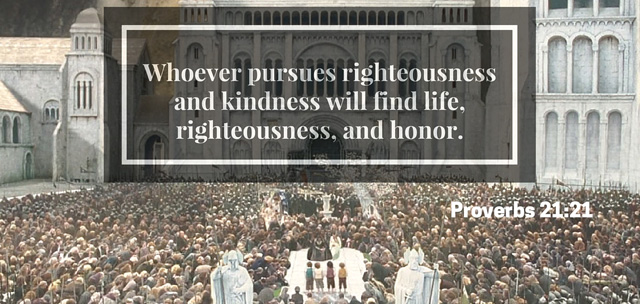THE TAKE AWAY
Honor Where it's Due
By Kersley Fitzgerald
Two Sundays ago was the last day of AWANA. Awards were given, kids were celebrated, leaders were praised. Well, all except for the two Commanders, Becky and our own MeLissa. So this Sunday, the pastor called them up. Becky was only a few rows back. She gave the half-grimace she wears whenever she's flustered, and tried to hide behind her hair. MeLissa was way in the back — in the hallway, in fact — and strode purposefully up to the front. She gave Becky a supportive half-hug and accepted the thanks and applause graciously. AWANA is our biggest outreach ministry, and we have a lot of kids whose families don't go to our church, so the recognition was well-warranted.
It reminded me of my favorite movie scenes. I'm not a movie-cryer by nature, but what will get me every time is when someone is honored.
In The Holiday, Kate Winslet's Iris has been helping Eli Wallach's Arthur walk without a cane so he can keep from embarrassing himself at what he thinks will be a small celebration of his Hollywood writing career. Instead of small, however, they walk into an auditorium filled with people rising to a standing ovation. With the help of Jack Black's specially-written music, he climbs the stairs to the stage without help, surprising even himself.
Another one is from the end of the Doctor Who episode Vincent and the Doctor. The Doctor and Amy take the depressed Vincent Van Gogh forward in time to see how his works of art are appreciated in his future. Vincent stands in awe while the docent, played by Bill Nighy, explains, "...to me Van Gogh is the finest painter of them all...He transformed the pain of his tormented life into ecstatic beauty...To my mind, that strange, wild man who roamed the fields of Provence was not only the world's greatest artist, but also one of the greatest men who ever lived." Vincent embraces and kisses the docent who quickly becomes very confused.
But the scene that absolutely slays me every time is near the very end of The Return of the King. Gandalf has crowned Aragorn King of Gondor; Elrond has presented him with Arwen to be his wife; and the nation is blessed and at peace. Aragorn and Arwen approach the four Hobbits, and the Hobbits bow. But Aragorn stops them, saying, "My friends. You bow to no one." He then takes a knee in his silver armor, Arwen bows next to him, and all of Gondor follows suit. Pippen is delighted. Merry looks satisfied. Sam looks like he's going to throw up. Frodo looks like he's thinking, "If they only knew..."
The planet can explode, the boy can lose the girl, and the cowboy's dog can die, but the scenes that get me are all about someone being recognized for the contribution they made and the honor of their character. And the funny thing is, it doesn't really translate to me. I get really uncomfortable when someone goes any further than a "good job." The greatest compliment someone can give me is "this thing you did helped." And even then, all I need is about one a year.
But there is precedence in the Bible — particularly in the New Testament. In Mark 14:3-9, when Mary of Bethany anoints Jesus' feet with incredibly expensive perfume, and then wipes them with her hair, Jesus rebukes the critical Judas and says "...truly, I say to you, wherever the gospel is proclaimed in the whole world, what she has done will be told in memory of her" (Mark 14:9). He regularly — publically — praised people's faith, be it the Canaanite woman (Matthew 15:28), the Centurion (Matthew 8:5-13), or the Gentile leper (Luke 17:11-19). Sixty years later, John praised Gaius for his gift of hospitality (3 John 5-8).
Not to be left out, Paul was always bragging on people. Most of his letters started out with an expression of thanks for them. In Philippians 2:25-30, he singles out the contribution of Epaphroditus. Two chapters later, in the middle of scolding Euodia and Syntyche to stop fighting, he gives them props for laboring with him for the gospel (Philippians 4:2-3). And he was well-known for gushing over Timothy.
It's good to honor others, but seeking honor is another matter (Luke 14:7-11). We are to live an honorable life, but always realize it's God Who judges. Proverbs has a lot to say about the character of a person who God honors: humble (Proverbs 20:3), righteous and kind (Proverbs 21:21), having the fear of the Lord (Proverbs 22:4), loyal (Proverbs 27:18), gracious (Proverbs 11:16). And our criteria for honor should be the same — not celebrity or power or athleticism, but righteousness and kindness. Wisdom and experience, like Arthur and Van Gogh (Leviticus 19:32). Self-sacrifice like the Hobbits. And, of course, we need to honor our parents (Matthew 15:4).
The Bible doesn't include a specific commandment to publically thank and note contributions others make. But Jesus did it. John and Paul did, too. Jesus promises God will give honor to His servants (John 12:26). And Ephesians 4:29 tells us to build one another up. It's not wrong to tell someone they did a good job. And it could go a long way in encouraging them to keep it up.
Even if they try to hide behind their hair.
Tags: Biblical-Truth | Christian-Life | Personal-Relationships
comments powered by Disqus
Published 5-24-16

